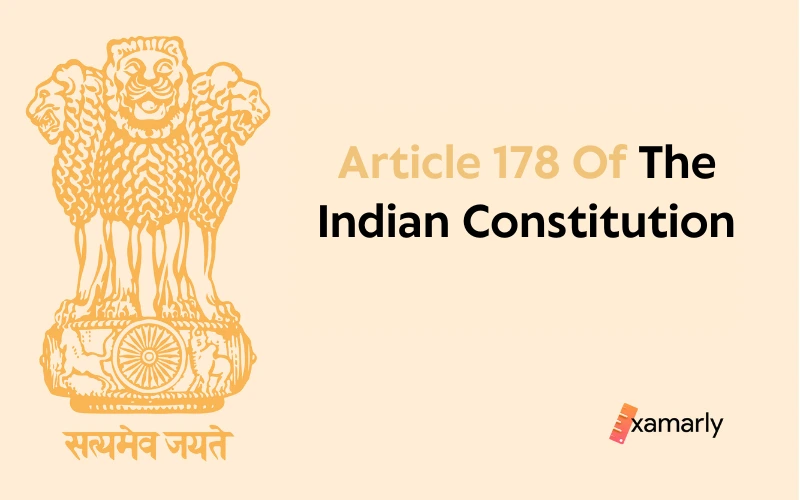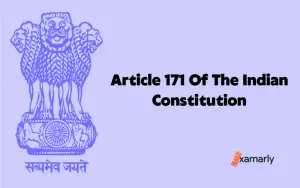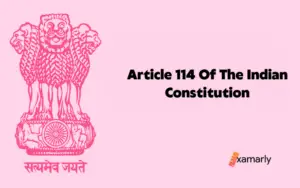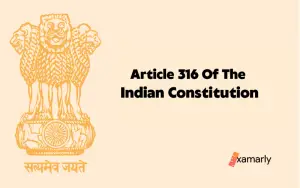Do you know what Article 178 of the Indian Constitution means when it comes to The Speaker and Deputy Speaker of the Legislative Assembly?
Article 178 of the Indian Constitution regulates the appointment of the Speaker and Deputy Speaker of the Legislative Assembly (also known as Vidhan Sabha).
Article 178 provides a legal framework for electing a person from amongst its members as a presiding authority of the LA. Knowing this provision is important to lawmakers and all citizens so they understand how their representatives will be chosen. Here’s an overview of what Article 178 says regarding the Speaker as well as the Deputy Speaker of a Legislative Assembly.
Article 178 Of The Indian Constitution
The Speaker and Deputy Speaker of a Legislative Assembly in India are discussed under Article 178 of the Indian Constitution. The constitutional provisions of the Article stated above are as follows:
Every State’s Legislative Assembly is required to elect two members to serve as its Speaker and Deputy Speaker as soon as possible. When one of those positions falls empty, the Assembly is then required to elect a new Speaker or Deputy Speaker, as appropriate.
Legislative Assembly
The real seat of power in a state is the Legislative Assembly, which is a body that is chosen by the people.
It is not allowed for an assembly to have a minimum strength that is lower than 60 or a maximum strength that is higher than 500.
Nonetheless, Sikkim, Arunachal Pradesh, Goa, etc., are just a few of the states that have been granted permission to operate with reduced-size Legislative Assemblies.
Speaker Of LA
Within the Legislative Assembly, the Speaker holds a prominent position.
The position of Speaker is nonpartisan, and it is the Speaker’s duty to ensure that all Members of the LA, regardless of the political affiliation of their membership, are treated equally and impartially.
The Speaker of the Legislative Assembly is responsible for continuing to hear the persons in his or her constituency and adequately representing the interests of those people while at the same time maintaining objectivity and avoiding taking public stands on politically contentious subjects that come before the Assembly.
Deputy Speaker Of LA
The Deputy Speaker is chosen from among the members of the Legislative Assembly, and the process for choosing him or her is the same as for choosing the Speaker.
Whenever the Speaker is not present or the Office of the Speaker is unoccupied, the Deputy Speaker is in charge of carrying out the responsibilities of the Speaker.
The Deputy Speaker has all the authority of the Speaker when presiding over a session of the LA.
Conclusion
Despite not having a lot of power, the speaker’s position is undoubtedly one of respect and honor. The role of the Speaker is analogous to that of an impartial referee between the governing party and the opposition. Making sure the opposition has enough room to criticize the government is a key duty of the Speaker.
For Further Readings:
| Article 93 Of The Indian Constitution (Speaker And Deputy Speaker Of Lok Sabha) | Article 166 Of The Indian Constitution |
| Article 176 Of The Indian Constitution | Article 177 Of The Indian Constitution |
FAQs On Article 178
Who Is Called The Speaker Of The Legislative Assembly?
In active politics, the term “Speaker of the Legislative Assembly” designates the chief spokesperson of the state legislative assemblies in India for conducting house proceedings. It is within his purview to decide the status of any bill that the state legislators bring before the house for consideration.
How Speaker And Deputy Speaker Of LA Are Chosen?
Both Speaker And Deputy Speaker are chosen from the members of the legislative assembly.
What Is Article 178 Of The Constitution?
Under Article 178 of the Indian Constitution, the Speaker and Deputy Speaker of a Legislative Assembly are subject to discussion. The Speaker and Deputy Speaker of the LA of each State shall be elected as soon as practicable. The Assembly must choose a new Speaker or Deputy Speaker, as appropriate, whenever one of those posts becomes vacant.
Is Having A Deputy Speaker Necessitated By The Constitution?
The phrases “shall” and “as soon as may be” are used in Articles 93 and 178, respectively, which indicates that not only is the election of the Speaker and Deputy Speaker essential, but it must also take place as soon as feasible, according to constitutional intellectuals.
How Speaker And Deputy Speaker Are Elected?
In accordance with Article 93 of the Indian Constitution for the Lok Sabha and Article 178 for the state Assemblies, each House “shall, as soon as may be,” elect two members to serve as Speaker and Deputy Speaker.






